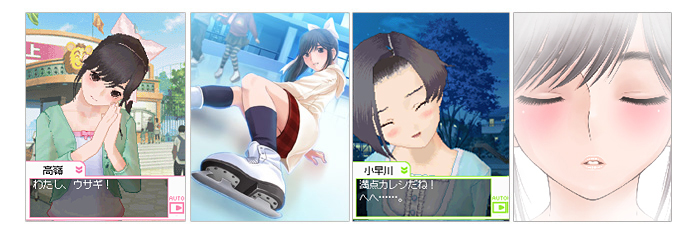[Famicompendium] LovePlus – Together in electric dreams
Hey everyone, how was your Valentine’s Day? Maybe you spent the day with your loved ones; maybe you spent it devouring chocolate. Personally I spent the day slaving over a Word document, trying my hardest to convey my true feelings on a truly bizarre romance. No, I wasn’t writing some kind of love letter – I was musing on Konami’s hella heteronormative “girlfriend simulator”, LovePlus. Games tend to stay away from handling romantic relationships, especially when compared to other mediums, so I was curious to see if this Nintendo DS title was really as original (and weird) as I’d heard. So can love truly blossom between a grown man and a DS cartridge?
The answer to that question is no. Absolutely not. But as someone who is fascinated in the potential of games to blend narrative and gameplay in developing fictional relationships, LovePlus is an incredibly interesting, albeit flawed take on interactive romance.
The game begins as a fairly standard dating sim in the vein of Konami’s own Tokimeki Memorial series. As a high school student, you need to decide what subjects and activities to focus on in order to increase your abilities. It’s noticeably simpler than Tokimeki Memorial, with only four stats to increase (fitness, intelligence, sense and charm), and only three eligible bachelorettes to woo. There’s Manaka Takane, a sheltered girl from a rich family who’s part of the tennis club; Rinko Koboyakawa, a rebellious first year who always wears earphones and appears isolated because of her father remarrying; and Nene Anegasaki, the eldest girl who serves as a sort of “big sister” character (she was originally intended to be a college student) and works with the protagonist at a family restaurant. Time management is key in LovePlus; it’s important to carefully choose what activities will raise the appropriate stats and allow you to encounter the right people, as there’s a strict time limit of 100 in-game days. Failing to get a girlfriend by the end of this period (yes, you can reject them) results in becoming trapped in a time loop and forced to relive your high school days over and over. Or at least I assume that’s what happens since I somehow hooked up with Manaka.

While getting a girl to confess her feelings for you typically marks the end of this kind of game, in LovePlus it’s only the beginning. After the credits roll, you have the option of continuing the game in “real-time” mode, where each day advances based on the DS’s built-in clock. Think Animal Crossing if you replaced your village with an anime girl, and if instead of growing weeds she gradually grows contempt towards you for not talking to her enough. Your girlfriend practically demands that you check in with her every day, or at least text her. You can also call her up and set a date, but you’d better have your DS switched on once she wants to go out somewhere or all hell will break loose (presumably – I would never do something like that). There are also various seasonal changes and real holidays and events that are reflected in-game, such as Valentine’s Day. It’s an original approach to the genre that takes the whole “dating-sim” aspect to its logical conclusion, but it also comes off as more than a little bit creepy.
The second part of the game also introduces the gameplay mechanics of kissing and “skinship.” While out on dates, you’ll sometimes have the option to touch your girlfriend (like, physically touch with the stylus) while nobody is looking. It’s one thing to play a dating sim role-playing as a high schooler, but a game encouraging me to stroke and whisper sweet nothings to teenage girls made me incredibly uncomfortable. Granted, it is all cute teenage romance stuff – there isn’t really anything racier than kissing and holding hands – but you can potentially touch places that would get me fifteen years in prison if Manaka was a Real Girl. The integration of the DS microphone is much cooler, anyway. “Beating” the game unlocks “LovePlus” mode, which takes the interaction even further and simulates conversation with your fictional girlfriend. The list of questions and answers that are recognised is a bit restrictive (and all in Japanese, naturally), but it’s an entertainingly awkward feature. While I stubbornly refuse to throw away my dignity and have lovely little chats with the anime girl who lives in my DS, the technology is really neat.

Much like Grand Theft Auto and Flappy Bird, LovePlus was one of the few games reported on not just by the games media, but plenty of mainstream news outlets as well. Unfortunately for Konami, the coverage was far from favourable. Turns out I wasn’t the only one who was a bit weirded out by LovePlus, as outlets like The Huffington Post latched onto the more “unique” aspects of the game and the perceived anti-social tendencies its audience. In some cases, the media attempted to tie the success of the software into Japan’s rapidly decreasing birth-rates, as was the case with the most cringe-worthy section of the BBC documentary “No Sex Please, We’re Japanese”. It sure did a good job of distracting from that other Nintendo DS game where you touch underage girls inappropriately to determine if they’re witches. Yeah… I probably won’t be covering that one.
While I do agree that obsessing over a fictional character to the point of marrying them (as was the case with one LovePlus player) is beyond unhealthy, the extensive criticism of the game is mostly undeserved. Japanese birth rates might be plummeting, but this appears to be due to broader societal shifts. Though LovePlus was a sales success, particularly by dating-sim standards, it did only sell to approximately 0.2% of the country’s population (and me). Besides, anyone who is detached enough from reality to consider one of the game’s characters as a real girlfriend probably shouldn’t be having kids anyway.

I do recall reading somewhere that LovePlus started as a misguided attempt to encourage high schoolers to get girlfriends. The fact that I can’t find any evidence to back that up means that it’s probably a lie, but according to series creator, Akari Uchida, the game’s audience is far broader than just lonely men. In an interview with The Telegraph, he said that ‘people imagine players are generally single and not very successful with women,’ when ‘in reality a lot are married with kids. There are people who consider this a substitute for a real girlfriend but most people play this as a performance, as a game.’ Then again, Uchida also produced the pervy fighting game Rumble Roses, so I wouldn’t be surprised if the game’s target demographic was just lonely men. In Uchida’s own words, the game’s aim was ‘to make people feel the girls inside the game really are their girlfriends: that they are pretty and have real feelings for them.’ And that’s perhaps why the game didn’t click with me.
LovePlus relies heavily on the player falling in love with or at least becoming attached to these fictional characters. Maybe I’m too cynical, but I didn’t particularly care for the game’s cast of dull, clichéd heroines. Each character is carefully crafted to be as appealing as possible, which comes off as incredibly unnatural. It’s an admiral attempt at emulating human interaction, but your female partner appears too passive. There are basic responsibilities required of the player in their role as boyfriend, but these only really extend to checking in with them every so often. Communication is barely required to sustain the relationship. This has the unfortunate side effect of your virtual girlfriend appearing more like a loyal dog than a human being; you don’t need to talk to them to receive attention, but it helps if you pat them on the head and go for walks.

LovePlus is ambitious in the way it handles interactions – it’s just that these interactions seem one-sided. For instance, if you think that Rinko has a dumb haircut (she does), you can encourage her to get a makeover, but this sort of influence doesn’t work both ways and LovePlus fails to encourage the player to evaluate the kind of person they are. The lack of agency the female characters possess is kind of disturbing and it sure is hard to form a romantic attachment so someone that the game treats as less than human. It also bugs me more than it should that there isn’t any contact with the other girls after completing the first part. As tends to be the case with dating-sims, each girl has a sort of character arc where the protagonist helps them with some particular issue like Manaka’s unpopularity or Rinko’s loneliness. These narratives are totally dropped once you enter into a relationship and it’s kind of sad that the game doesn’t let you view the cast as anything but potential lovers.
But the game is admittedly quite impressive on a technical level. The 3D models for the girls are all quite detailed (by the low standards of the DS) and there are lots of nice touches in terms of character animation. LovePlus also features some neat voice synthesis tech where the girls will actually say your name (assuming it’s three syllables or less and in Japanese). Unlike in Konami’s Tokimeki Memorial 2, which pioneered this feature, I couldn’t get anyone to address me as “Nicolas Cage”, but any voice acting in a DS game is still impressive and it’s an addition that makes the interactions feel more personal. I wouldn’t have expected a dating sim to push the DS to its limits, but LovePlus sure does; the game’s updated re-release, the imaginatively titled LovePlus+, is one of the few games that shipped on a 4 gigabit card – the largest supported by the console.

Released less than a year after the original game, LovePlus+ added a bunch of new content, including a hilarious anti-piracy mechanism that causes the girls to detest pirate players, making the game “unwinnable”. I did actually buy this expanded version only to find that the original game was in the case instead; I guess I should’ve sent it back and complained, but I just couldn’t bring myself to begin an e-mail by writing ‘so I bought this copy of LovePlus.’ LovePlus+ also included a new take on the classic Konami puzzle game, Taisen Puzzle-Dama. If versions of the game featuring Hell Girl, Castlevania and Hayate the Combat Butler weren’t enough, you can now play the game alongside all three LovePlus girls (and, strangely enough, characters from Rumble Roses and Pop ‘n Music). New Love Plus for the 3DS continued this trend of including ancient arcade games and let you play Twinbee and Yie Ar Kung Fu while out on dates at game centers. But New Love Plus’ biggest addition has to be the ability to use the console’s augmented reality features to take pictures with your virtual girlfriend, as demonstrated by one Satoru Iwata:

While I didn’t find LovePlus to be a particularly enjoyable game, it’s not hard to see why this title was such a success. Despite the fact that these feelings don’t appear genuine, it really does tap into the universal desire of being loved by someone. The satisfaction of developing your character and making progress in a relationship turns the game into a compelling, almost addictive experience. LovePlus is the kind of game that you play for just a few minutes each day so the relative lack of commitment does make it more enjoyable from a pure gameplay perspective. This does mean the game is hardly a realistic look at a “serious” relationship, but I’m sure that escaping from reality and embracing the game’s warm, friendly aesthetic is a selling-point for some people.
I appreciate that the game portrays relationships as an actual long-term commitment and the fact that it focuses on maintaining instead of developing a healthy relationship is refreshing. However, the weird gender dynamic and the fact that you’re dating a high-schooler call into question just how healthy this romance really is. That said, Uchida claims that plenty of players became more kind to their real-life partners as a result of playing LovePlus. While you won’t necessarily find true love in the words of these wide-eyed anime girls, if the game has the potential to make players approach actual relationships with more care and respect, I think that’s a really positive thing.
Import Friendliness: Moderate
It shouldn’t come as a surprise that LovePlus features plenty of Japanese text, though the majority of it is supported by voicework. For those who don’t want to deal with that, apparently there’s a fan-translation of the original game out there. I can’t speak for its quality since I didn’t realise it existed until I was already heavily invested in (read: bored of) the Japanese version, but it seems decent enough. The game still expects you to speak in Japanese, though it’s all optional. And if you’re a Japanese student after a partner for speaking practice – why not LovePlus?
After playing through LovePlus I might be more used to dating women than men, but I think I’m style savvy enough to handle the next game I have scheduled for this column.
